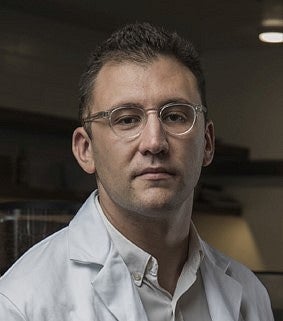Faculty bio | Research website | X / Twitter
Biography:
Christopher H. Hendon is a computational materials chemist and an international expert on the science of coffee. He authored the book, “Water For Coffee,” with Maxwell Colonna-Dashwood, a world champion level barista. Together, the two have won barista championships and transformed the art and science of espresso worldwide. As part of the University of Oregon’s Energy and Sustainable Materials Initiative, Hendon studies material properties that emerge from chemical imperfections. His work on these defects has applications in energy storage and conversion. Collaborating with colleagues from across disciplines, he’s looking for ways to create new designer materials that reduce the dependence on precious metals. Recently, his coffee research has become a permanent fixture in the university. The Oregon Coffee Laboratory was erected in Willamette Hall and is a public laboratory where Hendon (aka Dr. Coffee) studies the electrical properties of coffee extracts. He continues to work with and support local businesses, while maximizing his research impact within the coffee industry.
Recent Media:
- Coffee tariffs have been lifted, but some Portland cafés and roasters are still waiting for relief (CBS News, Dec. 1, 2025)
- How Eugene’s ‘coffee chemist’ might help save your morning cup (Lookout Eugene-Springfield, Oct. 28, 2025)
- Your cup of coffee loses flavor faster than you think—Here’s how to save it (Serious Eats, Sept. 8, 2025)
- How I learned to stop worrying and love light roast espresso (Wired, Sept. 2, 2025)
- More expensive than lobster? Portland’s coffee prices are rising as Trump’s tariffs set in (The Oregonian, Aug. 21, 2025)
- University of Oregon explores coffee chemistry and the future of coffee (Coffee Talk, Feb. 24, 2025)
- Nestle and Keurig want you to make iced coffee at home instead of paying a barista. That’s harder than it looks (CNN, Nov. 25, 2024)
- Why your coffee tastes so damn bitter and gross after microwaving it (SELF, Sept. 9, 2024)
- What you should know about mold in coffee (Everyday Health, July 26, 2024)
- Episode 48: Dr. Christopher Hendon on coffee chemistry (Lets Talk Chemistry - a science podcast by ChemTalk, May 18, 2024)
- The 7 biggest myths about your coffee, debunked by a scientist (BBC Science Focus, Feb. 18, 2024)
- Study seems to confirm secret ingredient for better coffee (CNN, Dec. 25, 2023)
- New UO study on the impact of coffee charge (KGW, Dec. 10, 2023)
- This simple trick will help you brew better coffee, according to scientists (Smithsonian Magazine, Dec. 7, 2023)
- There’s a better way to grind coffee, according to science (The Washington Post, Dec. 6, 2023)
- A superconductor claim blew up online. Science has punctured it. (The Washington Post, Aug. 9, 2023)
- According to Research, 45% of Coffee Beans Contain Toxic Mold—Should You Be Worried About What’s In Your Cup? (Parade, March 24, 2023)
- What’s the future for espresso? (Perfect Daily Grind, Jan. 9, 2023)
- We Tested Four Popular Siphon Coffee Makers—These Were The Best Ones (Serious Eats, Oct. 12, 2022)
- Is decaf coffee caffeine-free? ‘Dr. Coffee’ shares the answer. (Inverse, Sept. 13, 2022)
- Electric fields bring new dimension to debate on atomic size (Chemistry World, June 8, 2022)
- UO chemist is chosen to forge a path to better espresso (OregonNews, Nov. 13, 2020)
- University of Oregon in Eugene Awarded Grant for New Espresso Brewing Control Chart (Specialty Coffee Association, Nov. 12, 2020)
- Expert says we are all making coffee wrong and tells the one thing we should not do (RSVP Magazine, Oct. 15, 2020)
- You can brew better coffee at home. A chemistry professor explains how. (The Wall Street Journal, May 22, 2020)
- Espresso may be better ground coarser (Scientific American, Feb. 13, 2020)
- Using chemistry to get the perfect cup of coffee (Science Friday, Jan. 24, 2020)
- Brewing a better espresso with less coffee and more math (Canadian Broadcasting Company, Jan. 24, 2020)
- Materials scientists learn we’ve been brewing espresso all wrong (VICE, Jan. 22, 2020)
- How to make the perfect cup of coffee – with a little help from science (The Conversation, Jan. 22, 2020)
- Science may have found the secret to a better, and more sustainable, espresso coffee shot (CNN, Jan. 22, 2020)
- UO chemist helps find path to consistently good espresso (OregonNews, Jan. 22, 2020)
- For better coffee, start with fewer beans (Popular Science, Jan. 22, 2020)
- The Science Behind Crafting a Perfect Espresso (Wired, Jan. 22, 2020)
- Mathematicians Say They've Figured Out How to Brew a Better Espresso Shot (Discover Magazine, Jan. 22, 2020)
- UO, MIT collaborate on material with surprise electrical properties (OregonNews, Dec. 4, 2019)
- Chemical and physical considerations in coffee production with Christopher Hendon (Bean Scene Magazine, Nov. 12, 2019)
- The chemistry of coffee and a gassy alcohol (Chemical & Engineering News, Aug. 30, 2019)
- A Bitter End For Regular Joe? Scientists Engineer A Smooth, Beanless Coffee (National Public Radio, July 8, 2019)
- The Coldest Brew of All—Coffee Aficionados Freeze Beans to 58 Below Zero (The Wall Street Journal, Feb. 12, 2019)
- Endless cups most beautiful (Eugene Weekly, Feb. 7, 2019)
- Dr. Coffee to reveal the secrets of a consistent cup at pub talk (OregonNews, Jan. 4, 2019)
- Dr. Coffee (OregonNews, Dec. 4, 2017)
- Brewing a great cup of coffee depends on chemistry and physics (The Conversation, Sept. 27, 2017)
- Specialty Coffee’s Resident Scientist (The Atlantic, April 28, 2016)
- Computational chemist to join energy and materials cluster (OregonNews, Feb. 22, 2017)


